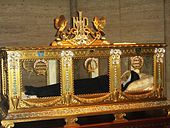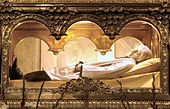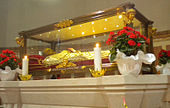- Incorruptibility
-
 The body of Saint Virginia Centurione, found to be incorrupt by the Catholic Church.
The body of Saint Virginia Centurione, found to be incorrupt by the Catholic Church.
Incorruptibility is a Roman Catholic and Eastern Orthodox believe that supernatural (or Godly) intervention allows some human bodies (specifically saints) to avoid the normal process of decomposition after death as a sign of their holiness. Bodies that reportedly undergo little or no decomposition, or delayed decomposition, are sometimes referred to as incorrupt or incorruptible.
Contents
Roman Catholicism
Although incorruptibility is still recognised as supernatural in Roman Catholicism, it is no longer counted as a miracle in the recognition of a saint.[1][clarification needed]
Incorruptibility is seen as distinct from the good preservation of a body, or mummification. Incorruptible bodies are often said to have the odour of sanctity, exuding a sweet or floral, pleasant aroma.
In Roman Catholicism, if a body remains incorruptible after death, this is generally seen as a sign that the individual is a saint, although not every saint is expected to have an incorruptible corpse.
When the Catholic Church recognized incorruptibles, a body was not deemed incorruptible if it had undergone an embalming. As such, although the body of Pope John XXIII remains in a remarkably intact state, after its exhumation, Church officials quickly pointed out that the Pope's body had been embalmed and that there was a lack of oxygen in his sealed triple coffin.
Eastern Orthodox Church
 Incorrupt relics of Anthony, John, and Eustathios at the Orthodox Church of the Holy Spirit in Vilnius, Lithuania.
Incorrupt relics of Anthony, John, and Eustathios at the Orthodox Church of the Holy Spirit in Vilnius, Lithuania.
To the Eastern Orthodox Church, Incorruptibility continues to be an important element for the process of glorification. An important distinction is made between natural mummification and what is believed to be supernatural incorruptibility. There are a great number of eastern Orthodox saints whose bodies have been found to be incorrupt and are in much veneration among the faithful. These include:
- Anthony, John, and Eustathios
- Saint Alexander of Svir - the incorrupt relics of the saint were removed from the Svir Monastery by the Bolsheviks on December 20, 1918 after several unsuccessful attempts to confiscate them. Finally, the holy relics were sent to Petrograd's Military Medical Academy. There they remained for nearly eighty years. A second uncovering of St Alexander's relics took place in December 1997, before their return to the Svir Monastery.[2]
- Saint Dmitry of Rostov
- Saint Job of Pochayiv
- Saint John the Russian
- Saint Nectarios of Aegina
- Saint Seraphim of Sarov
- Saint Spyridon
- Dionysios of Zakynthos
- Gerasimus of Kefalonia
- Saint Zosima
- Saint Elizabeth
Causes
The two main positions on incorruptibility can be summarized as an argument for a physical or environmental cause, and an argument for a spiritual cause.[citation needed]
Physical causes include conditions such that decomposition is significantly slowed down. There are a number of ways of retarding decomposition, but the mechanism commonly stated is that of saponification.[3] Another environmental condition that can be the cause of retarding decomposition is a burial ground that is cool and dry. The retardation of decomposition also occurs if the ground is composed of soil that is high in certain compounds that bring the bodies' moisture to the surface of the skin. It is also suggested that bodies with low amounts of muscle and body fat tend to resist decomposition better.[citation needed]
Alternatively, bodies may simply have been embalmed, which greatly decreases the rate at which they decompose.[3]
The argument for a spiritual cause may include a belief that the pious nature of the individual in some way permeated the flesh (a metaphysical cause having a physical effect), or a belief that decomposition was prevented by the intervention of God, or some other supernatural agent, as the body will be resurrected later.[citation needed]
Instances of claimed incorruptibility of Roman Catholics
The saints and other Christian holy men and women whose bodies are said to be or to have been incorrupt have been catalogued in The Incorruptibles: A Study of the Incorruption of the Bodies of Various Catholic Saints and Beati a 1977 book by Joan Carroll Cruz.[4] Claimed incorruptibles include:
Saints
 The body of Saint Bernadette of Lourdes with wax face and hand coverings, found to be incorrupt by the Catholic Church. (b. January 7, 1844 – d. April 16, 1879).
The body of Saint Bernadette of Lourdes with wax face and hand coverings, found to be incorrupt by the Catholic Church. (b. January 7, 1844 – d. April 16, 1879).
 The body of Saint John Mary Vianney wearing a wax mask, found to be incorrupt by the Catholic Church. (b. 8 May 1786 – d. 4 August 1859).
The body of Saint John Mary Vianney wearing a wax mask, found to be incorrupt by the Catholic Church. (b. 8 May 1786 – d. 4 August 1859).
 The body of Saint Padre Pio of Pietrelcina wearing a silicone mask, found to be incorrupt by the Catholic Church. (b. 25 May 1887 – d. 23 September 1968).
The body of Saint Padre Pio of Pietrelcina wearing a silicone mask, found to be incorrupt by the Catholic Church. (b. 25 May 1887 – d. 23 September 1968).
 The body of Saint Joaquina de Vedruna, found to be incorrupt by the Catholic Church. (b. April 16, 1783 – d. August 28, 1854).
The body of Saint Joaquina de Vedruna, found to be incorrupt by the Catholic Church. (b. April 16, 1783 – d. August 28, 1854). The body of Saint Zita, found to be incorrupt by the Catholic Church. (born c. 1218 - d. 27 April 1272).
The body of Saint Zita, found to be incorrupt by the Catholic Church. (born c. 1218 - d. 27 April 1272).
 The body of Saint Catherine Labouré, found to be incorrupt by the Catholic Church. (b. May 2, 1806 – d. December 31, 1876).
The body of Saint Catherine Labouré, found to be incorrupt by the Catholic Church. (b. May 2, 1806 – d. December 31, 1876). The body of Venerable Mary of Jesus of Ágreda, found to be incorrupt by the Catholic Church. (b. April 2, 1602 – d. May 24, 1665).
The body of Venerable Mary of Jesus of Ágreda, found to be incorrupt by the Catholic Church. (b. April 2, 1602 – d. May 24, 1665).
 The body of Saint Louise de Marillac, found to be incorrupt by the Catholic Church. (b. August 12, 1591 - d. March 15, 1660).
The body of Saint Louise de Marillac, found to be incorrupt by the Catholic Church. (b. August 12, 1591 - d. March 15, 1660).
 The body of Saint Luigi Orione, found to be incorrupt by the Catholic Church. (b. June 23, 1872 – d. March 12, 1940).
The body of Saint Luigi Orione, found to be incorrupt by the Catholic Church. (b. June 23, 1872 – d. March 12, 1940).
- Saint Agatha
- Saint Agnes of Montepulciano
- Saint Albert the Great
- Saint Alphege of Canterbury
- Saint Andrew Bobola
- Saint Angela Merici
- Saint Anthony Maria Zaccaria
- Saint Antoninus
- Saint Benedict the Moor
- Saint Benezet
- Saint Bernadette Soubirous
- Saint Bernardine of Siena
- Saint Camillus de Lellis
- Saint Catherine Labouré
- Saint Catherine of Bologna
- Saint Catherine of Genoa
- Saint Catherine de Ricci
- Saint Catherine of Siena
- Saint Charbel Makhluf
- Saint Charles Borromeo
- Saint Cecilia
- Saint Clare of Montefalco
- Saint Coloman
- Saint Cuthbert
- Saint Didacus of Alcala (San Diego de Alcala)
- Saint Dominic Savio ( 1842 - 1857 )
- Saint Edmund Rich of Canterbury
- Saint Edward the Confessor
- Saint Etheldreda
- Saint Eustochia Calafato
- Saint Frances of Rome
- Saint Francis de Sales
- Saint Francis Xavier
- Saint Frances Xavier Cabrini
- Saint George Preca
- Saint Germaine Cousin
- Saint Guthlac
- Saint Annibale Maria di Francia (Founder of the Rogationist and Daughters of Divine Zeal)
- Saint Herculanus of Piegaro
- Saint Hugh of Lincoln
- Saint Idesbald
- Saint Isidore the Farmer
- Saint Jane Frances de Chantal
- Saint Jean-Marie-Baptiste Vianney (The Curé of Ars)
- Saint Jeanne de Lestonnac
- Saint Joaquina de Vedruna
- Saint John Bosco
- Saint John Neumann
- Saint John of God
- Saint John of the Cross
- Saint John Southworth
- Saint Josaphat
- Saint Julie Billiart
- Saint Louis Bertrand
- Saint Louise de Marillac
- Saint Luigi Orione
- Saint Lucy Filippini
- Saint Madeleine Sophie Barat
- Blessed Mafalda of Portugal[5]
- Saint Margaret of Cortona
- Venerable Mary of Jesus of Ágreda
- Saint Maria Goretti
- Saint Martin de Porres
- Saint Mary Magdalen de' Pazzi
- Blessed Mary of the Divine Heart[6]
- Saint Nicholas of Tolentino
- Saint Pacifico of San Severino
- Saint Pascal Baylon
- Saint Peregrine Laziosi
- Saint Philip Neri
- Saint Pierre Julien Eymard
- Saint Pio of Pietrelcina
- Saint Rita of Cascia
- Saint Romuald
- Saint Rose of Lima
- Saint Rose of Viterbo
- Saint Rose Philippine Duchesne
- Saint Silvan
- Saint Sperandia
- Saint Stanislaus Kostka
- Saint Teresa of Avila
- Saint Teresa Margaret of the Sacred Heart (Anna Maria Redi)
- Saint Ubald of Gubbio
- Saint Veronica Giuliani
- Saint Vincent de Paul
- Saint Vincent Pallotti
- Saint Waltheof
- Saint Werburgh
- Saint Withburga
- Saint Wunibald
- Saint Zita
See also
- Bog body
- Buddhist mummies
- Paramahansa Yogananda
- Sokushinbutsu
Footnotes
- ^ Archived at The Incorruptibles, The bodies of many medieval Catholic saints and martyrs have resisted decay for centuries— just the sort of mystery that begs for scientific inquiry, By Heather Pringle, Discover Vol. 22 No. 6 (June 2001)
- ^ The Marvelous Wonderworker of All Russia, Holy Venerable Alexander of Svir. St. Petersburg: Holy Trinity Monastery of St. Alexander of Svir, 2002.
- ^ a b http://www.skepdic.com/incorrupt.html
- ^ Carroll Cruz, Joan (1977). The Incorruptibles: A Study of the Incorruption of the Bodies of Various Catholic Saints and Beati. Charlotte, NC: TAN Books. ISBN 0-89555-066-0.
- ^ "Arouca, ainda mal conhecida". Aveiro e o seu Distrito. December 1967. http://www.prof2000.pt/users/avcultur/aveidistrito/boletim04/page09.htm.
- ^ Junta de Freguesia de Ermesinde The Church of the Good Shepherd
References
- The Incorruptibles: A Study of the Incorruption of the Bodies of Various Catholic Saints and Beati, by Joan Carroll Cruz, OCDS, TAN Books, June 1977. ISBN 0-89555-066-0.
External links
- "Incorrupt Bodies Of the Saints". Archived from the original on 2008-06-14. http://web.archive.org/web/20080614055125/http://www.catholicapologetics.info/library/gallery/incorrupt.htm.
- St Dionysios of Zakynthos
- St. Spyridon and other religious traditions on Corfu
- St Spyridon the Wonderworker and Bishop of Tremithus
Categories:- Death
- Incorrupt saints
- Miracles
Wikimedia Foundation. 2010.


